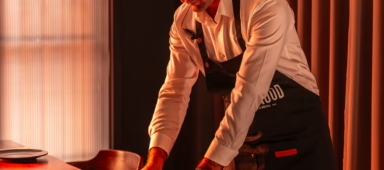Jakarta’s Pasar Santa gives new meaning to cool shopping
With the amount of venture capital pouring into Indonesia’s economic dynamo – one startup fund is even named 500 Durians after Jakarta’s fruity sobriquet, the Big Durian – it’s no surprise to find resourceful Indonesians jumping on current trends, taking risks and bootstrapping their way into small business ventures. This buzz can all be overheard in Pasar Santa, a trendy market in South Jakarta, which has emerged as the hub of opportunity and innovation.
Upon first glance, Pasar Santa may seem unassuming and ordinarily Indonesian: a small building with limited parking space, street stalls and tall roadside greenery. Yet its three-tone, retro-coloured exterior gives you a hint of what’s brewing inside in this hub of communal creativity.
A unique mixture of market antonyms, Pasar’s lower floors are occupied by wet vendors along with tailors, clothing stores, and stationery shops. However, in a new policy to attract business to an empty upper floor, the management has set aside space for young, imaginative entrepreneurs.
Vintage clothing stores, antique and record shops, coffee kiosks and a Mexican cantina are just a few of the amenities offered up a la mode. Book launches, workshops and art exhibitions have also been organised to drum up support for this alternative shopping lifestyle.
Most of the businesses are community and not profit-driven; owners regard their stalls as experimental side money away from their day jobs. There has been an increasing hipster clientele hungry for the new and fashionable. Potlucks, pantomime shows and cooking competitions have been a huge success in spreading the word, complementing Facebook, Twitter and Instagram.
Bear & Co, a manual brew ‘pop-up coffee bike’, has parked its wheels to sell coffee served from the taps you’d get your beer from. There’s also ABCD, or ‘A Bunch of Caffeine Dealers’, whose main activity is to license baristas as well as increase the public’s appreciation for coffee. There is no set price; the daily coffee variety is written on a glass window, and you pay into a tip jar.
“Our main goal is to share highly curated specialty-grade coffee beans from the best roasters in the world,” explains Ve Handojo, screenwriter and co-owner at ABCD. “We want to give a real coffee experience, not café experience; we want people to have a coffee lifestyle, not café lifestyle.”
The most attractive feature of Pasar’s partnership is the rent. At USD255 per year, the risk of financial bust for startups is significantly minimised. Currently, there are about 350 stalls rented out. More and more vendors are setting up shop by the day, adding something unique to Pasar’s growing reputation as the meeting place for photographers, painters, designers and writers.
While enjoying your piccolo at ABCD or chowing down on noodles from Mie Chino, you might just catch an impromptu performance of street musicians, a brass ensemble, a ballet dance, or even a spontaneous ‘secret gig’ by a local DJ playing eclectic tunes. Sameness and predictability, features which define shopping centres all over the city, is not what Pasar’s patrons look for.
“What is unique about Pasar Santa is the passion of the people,” says Samson Pho, one of Pasar’s first vendors and the owner of Laidback Blues Records, a record shop which has seen much success via Instagram and Facebook. The vendors “have potential (to grow) but with minimum capital. They could afford to put on a showcase or open up a shop. This is why money takes second priority. We could just be true to ourselves and hold on to the idealism instead of the reality.”
Despite its key location, the neighbourhood’s affluent prefers the high-end grocery stores and luxury shopping malls. Jakarta is no stranger to shopping malls, as there are a total of more than 170. They are often perceived as the antithesis to community-building and the root cause of Jakarta’s consumer society. As a result, mall mentality is what Pasar’s vendors are looking to revamp and revolutionise.
Enter POST, an antagonist to the ubiquitous, overbearing shopping mall. Considered a spontaneous concept-place, POST does something different every week by a different member of its artists’ collective. From selling handmade jewellery, pop culture T-shirts and used books to putting on a poetry slam or giving art classes, a personal touch is given by every organiser, a rule which falls under the banner ‘books, gatherings, and all things creative’. Redefining the concept of public space is a key value, besides encouraging connections among visitors.
The idea is also to get people interested in the lower floors, where you could find a mud-tinged carrot or that perfectly imperfect hot pepper (as opposed to produce that’s nicely packaged but overpriced in a mall). Cheaper in price but higher in quality, Pasar’s produce is harvested by hands, not a part of the corporate chain. The outlook is to keep money in the community rather than have it trickle down from the higher-ups.
Pasar Santa is a hidden gem worth seeking out. Slightly underground, this cool, bohemian marketplace makes a contribution to the growing grassroots community. No posing and selfie sticks – it isn’t that kind of a locale.




